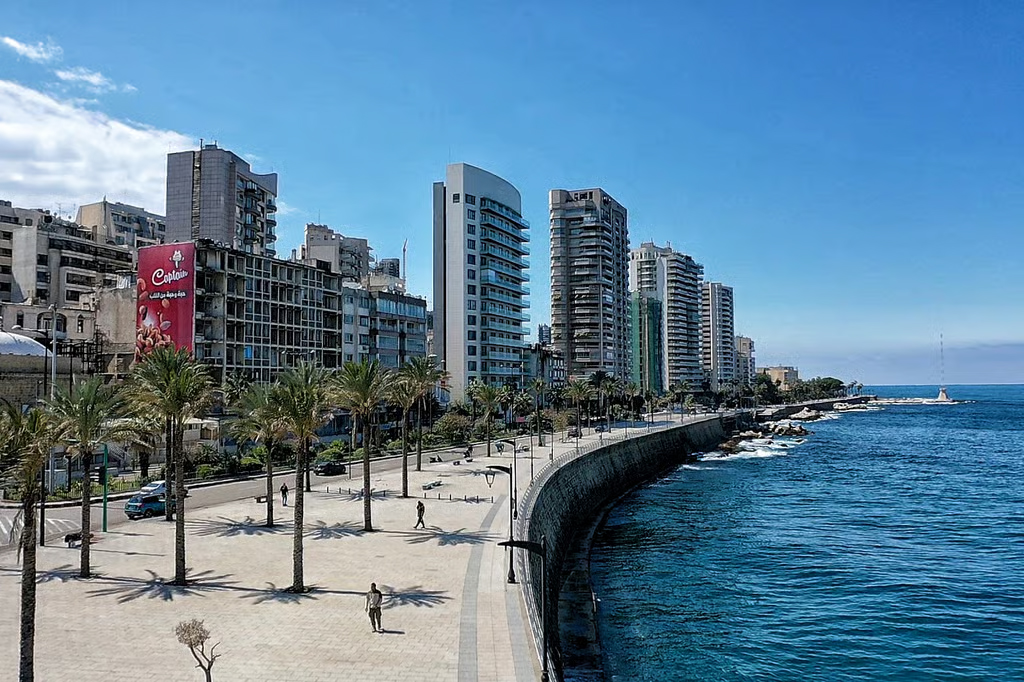Syrian Novelist Samar Yazbek Perceives Lebanon’s Identity as Shaped by Openness Rather Than Stability
Life goes on in affluent downtown Beirut, despite the current financial crisis. Photograph credit AFP via Getty Images.
Samar Yazbek’s analysis of Beirut aligns with that of a political and cultural historian, uncovering previously hidden and lesser-known aspects of the city. In her analysis of "Beirut... The Fragility That Guards Memory,"* published in The New Arab, Yazbek assumes the roles of historian, political scientist, and chronicler of the city, uncovering the lesser-known aspects of the Lebanese capital's modern history. A novelist and journalist who recently returned to Syria after spending over a decade in exile in Europe, she has been a prolific commentator on the post-Assad Syria. Beirut’s vulnerabilities, whether through its turbulent history or ongoing challenges, paradoxically act as a means of safeguarding its rich heritage and the memories embedded within its spaces and people. Lebanon’s identity is described as fragile, mixed, and unsettled, shaped by openness and transience rather than stability.
In Beirut, this identity emerges through its fractures and transient elements, setting it apart from the rigidity of the surrounding Arab authoritarian states. Beirut's essence lies not in stability or architecture but in its fragility and openness. Yazbek’s central argument about Beirut’s unique identity is that it resists linear, conventional understandings of history, time, and urban development, implying that it is unlike other cities. Beirut, as viewed by Yazbek, is not a city that can be neatly narrated through a sequence of events or developmental stages (e.g., foundation, growth, modernization, conflict, and recovery). The expectation of historical coherence or planned evolution doesn’t apply to her narration.
Lest it not be misunderstood, Beirut’s fragility for Yazbek need not be defined as weakness, but as an essential characteristic that shapes its urban, cultural, and emotional identity. The city's fragility mirrors its cultural institutions, which are temporary but foster vibrant cultural exchange.
The city’s emotional fragility, marked by a lack of safety or stability caused by wars and civil conflicts, fosters fleeting yet meaningful human connections. These forms of fragility symbolize resilience and openness, representing the ability to hold memories and meaning without being fixed or permanent.
Beirut's "luminal" position, as described by Yazbek, lies between repression and imagination, positioning it not as a center of power but as a symbol of freedom and innovation. This distinct marginality, shaped by "force of absence" — the lack of state control and censorship prevalent in many Arab states — has fostered a vibrant cultural and intellectual environment. Beirut stands out among neighboring Arab capitals, celebrated not as the center but as the "moving margin," embracing its marginality as a source of creativity and possibility. It has become an iconic hub for open discourse, artistic experimentation, and intellectual refuge.
Nothing highlights the traditional preservation of memory more than in the aftermath of Assad's downfall. The comparative and contrast method between Lebanon and Syria illustrates two distinct approaches. Memory in Beirut is preserved not through monuments or institutions, as in Syria under the Assads, but through fleeting experiences, temporary affiliations, and the influence of exiles, intellectuals, and artists. This form of belonging transcends nationalist or territorial definitions, emphasizing a lived, porous memory carried by people rather than archives.
Lebanese resilience in the face of wars and conflicts, including the Israeli bombardment and past domestic strife, has been widely documented. Yazbek describes their resistance as enabling life to continue through simple acts like 'cafés opening their doors' and 'conversations drifting from balconies.' This quiet commitment to living, speaking, and gathering, as Yazbek and others observe, is not characterized by grand gestures but by cultural and existential defiance. Persistence, though subtle, emerges as a profound and vital form of resistance.
The Arab world experienced the rise and fall of grand narratives, including Arab nationalism, socialism, and communism. Lebanon and its universities were at the center of these movements. Even as their significance waned, Beirut remained unchanged. These narratives have faded, and the city no longer seeks to present itself as a model or glorify itself. Instead, it persists in quiet continuity, "walking in the present on the feet of memory." This reflects a post-heroic view of history, where meaning is found in the personal, the fragmented, and the lived, as noted by Yazbek.
Beirut's liminal position offers a sense of transformation and freedom. It is portrayed as a transitional space, a city that serves more as a passage than a final destination. It provides fleeting 'moments of dwelling' instead of lasting refuge, fostering encounters, conversations, and drafts — acts of transformation rather than permanence. This liminal quality makes Beirut an exceptional place where even the faintest sense of freedom can briefly flourish.
Samar Yazbek reveals much about Beirut that many non-Lebanese are unaware of. Her essay is neither romantic nor pragmatic. It is a narrative so rich that it makes you want to read more about Lebanon's capital. Samar Yazbek’s Beirut is not a mythological golden city, nor a fallen utopia. It is a contradictory, wounded, and vital place where the absence of stability makes room for possibility. It is also a place where the unfixed and fragile become bearers of memory, freedom, and meaning. In this vision, Beirut is less a geographical location than an emotional and ethical space, where freedom whispers rather than roars.
*Samar Yazbek’s essay, “Beirut... The Fragility That Guards Memory," was published in Arabic in The New Arab.
This article appeared in Inside Al Jadid Reports, No. 124, 2025.
Copyright © 2025 AL JADID MAGAZINE

